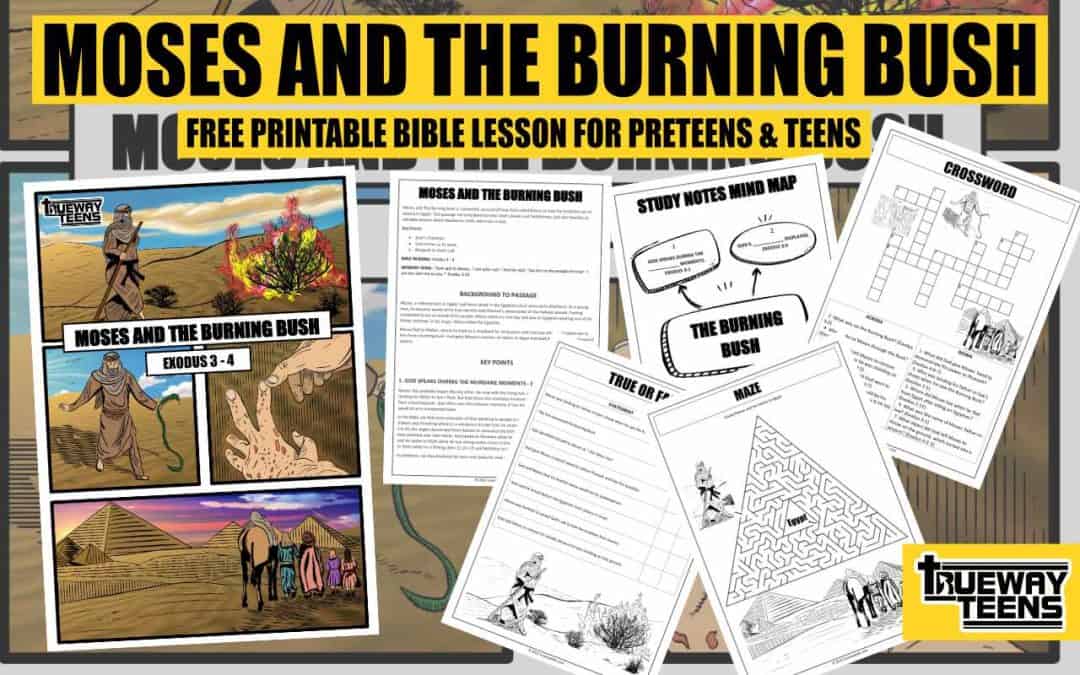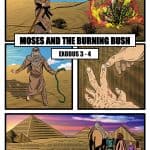Moses and The Burning Bush is a powerful account of how God called Moses to lead the Israelites out of slavery in Egypt. This passage not only demonstrates God’s power and faithfulness, but also teaches us valuable lessons about obedience, faith, and trust in God.
Key Points
- God’s Character.
- God invites us to serve.
- Respond to God’s call.
BIBLE READING: Exodus 3 – 4
MEMORY VERSE: “God said to Moses, “I am who I am.” And He said, “Say this to the people of Israel: ‘I am has sent me to you.’” Exodus 3:14
DOWNLOAD THE FREE PRINTABLE LESSON

BIBLE STUDY NOTES FOR TEENS
BACKGROUND TO THE PASSAGE
Moses, a Hebrew born in Egypt, had been raised in the Egyptian court since early childhood. As a young man, he became aware of his true identity and Pharaoh’s persecution of the Hebrew people. Feeling compelled to act on behalf of his people, Moses went out one day and saw an Egyptian beating one of his fellow Hebrews. In his anger, Moses killed the Egyptian.
Moses fled to Midian, where he lived as a shepherd for forty years until one day when God called out to him from a burning bush. God gave Moses a mission: to return to Egypt and lead the Hebrew people out of slavery.
KEY POINTS
1. GOD SPEAKS DURING THE MUNDANE MOMENTS – EXODUS 3:1
Moses’ day probably began like any other. He rose with the rising sun, ready to start the long day of tending his father-in-law’s flock. But God chose this everyday moment to get Moses’ attention by speaking from a burning bush. God often uses the ordinary moments of our lives as an opportunity to teach us and speak to us in unexpected ways.
In the Bible, we find many examples of God speaking to people in mundane moments. For instance, when Gideon was threshing wheat in a winepress to hide from his enemies, God called him (Judges 6:11). In Luke 2:8-20, the angels descended from Heaven to announce the birth of Jesus before a group of shepherds as they watched over their flocks. God spoke to Abraham while he was resting in the shade (Genesis 18:1), and He spoke to Elijah while he was sitting under a tree (1 Kings 19:9). In the New Testament, Jesus speaks to Peter while he is fishing (John 21:15-17) and Matthew as he is collecting taxes (Matthew 9:9-13).
As believers, we should always be open and ready for God to speak to us in the most unexpected of times.
2. GOD’S CHARACTER DISPLAYED – EXODUS 3:5
Moses’ encounter with God at the burning bush teaches many things about God’s character.
God is Holy: God instructed Moses to take off his sandals, for he was standing on holy ground. God is the only one who is pure and holy, who can never be tainted by sin or evil. The Bible declares that God is holy, which means He is without flaw and utterly perfect in every aspect of His being.
God is unchanging: When Moses asked God what name he should give if the people of Israel asked for one, God declared, “I am who I am”, expressing His absolute holiness, power, and majesty. The phrase “I am who I am” also shows us that God is unchanging. He is “the same yesterday, today and forever” (Hebrews 13:8). In Malachi 3:6, God says, “For I, the Lord, do not change.”
God is compassionate: In Exodus 3:7, God says: “I have surely seen the affliction of my people who are in Egypt and have heard their cry because of their taskmasters. I know their sufferings,” These verses remind us that God always sees and cares for our struggles. The Bible is full of verses demonstrating God’s deep care and love for His people. Psalm 103:13: “As a father has compassion on his children, so the LORD has compassion on those who fear him,” and Isaiah 40:11: “He tends his flock like a shepherd: He gathers the lambs in his arms and carries them close to his heart;”
God knows our struggles and cares deeply for us.
3. PART OF GOD’S REDEMPTIVE PLAN – EXODUS 3:10
God spoke to Moses in the burning bush, saying, “I have heard the cries of my people in Egypt, and I am sending you down to rescue them.” God didn’t have to involve Moses in His plan to rescue His people from bondage in Egypt, but He did. God had all the power and resources needed to save them without any help, yet, He chose to offer Moses a part in His redemptive plan. This serves as a reminder of how God invites us to partner with Him.
In the New Testament, Jesus calls us to be His disciples and take His message of hope and redemption to the world. He calls us to share the Good News with others so they can experience the joy of salvation (Matthew 28). In doing so, we have the privilege of actively participating in God’s redemptive plan.
We are part of a much bigger plan to rescue people from bondage, heal brokenness, and reconcile man to God.
God does all the work. He merely calls us to take His message and spread it to others because He has empowered us with the ability to do it. As believers, our involvement in God’s redemptive plan is a deep privilege and should be embraced with joy.
4. DON’T RESPOND WITH EXCUSES – EXODUS 4:1
Moses did not respond to God’s call with excitement but with excuses.
- Moses felt insignificant and questioned, “Who am I?” (3:11). Humanly speaking, he was right to feel that way. Unassisted, even the strongest of us are inadequate. In response, God promised Moses reassurance saying, “I will be with you” (3:12).
- Moses claimed He didn’t know enough. (3:13). Again, God had an answer for Moses “Don’t worry if you are unable, “I AM.”
- Moses said that others would not take him seriously. (4:1) God provided three miraculous signs demonstrating His power and glory. (see 4:2-9).
- Moses next claimed He was no good with words (4:10). God promises to teach him what to say (4:11-12).
In a desperate attempt, Moses finally said to God, “Please, Lord, Send someone else.” Even with all the reassurance God had given him before, Moses was still unwilling to obey.
How do you respond when God call you to do something? Do you start to list excuses or respond with willingness? We should respond with excitement and joy when God asks us to serve! Participating in God’s redemptive plan is a profound privilege and honour.
CONCLUSION
In Exodus 3:1-15, Moses encounters the burning bush and is invited to be part of God’s redemptive plan. Despite his initial hesitations and excuses, God offers reassurance by letting Moses know He will be with him, that He has power and glory, and that He will provide the words needed for him to speak. This story serves as a reminder of God’s deep care and love for His people. God invites us to partner with Him in His redemptive plan. Don’t respond with excuses when God calls but accept the invitation to be part of God’s amazing plan!
Read full notes in the pdf lesson
YOUTH GAMES AND ACTIVITIES – Moses and the Burning Bush
NOTICE WHAT IS DIFFERENT
- Materials: Items related to the story of Moses and The Burning Bush, such as leaves, sandals, staff, sheep, etc.
- Place the items related to the story of Moses and The Burning Bush on the floor or a table.
- Allow the youth group to study the items for 30 seconds, and then have them turn around.
- Remove one item from the collection.
- Have the youth turn back around and try to identify which item has been removed.
- The youth who correctly identifies the missing item wins the game.
- This game also encourages youth to be mindful of the ways God speaks to us and catches our attention, even in the small details of our lives.
FLIP FLOP TOSS
- Materials: A pair of flip flops per team, A bucket or box per team, A designated throwing line.
- Place the bucket or box a few feet away from the throwing line for each team.
- Have each team stand behind the throwing line and take turns tossing their flip flops into the bucket or box.
- Each successful toss earns one point.
- Remember how Moses was told to remove his sandals.
BURNING BUSH PRAYER ACTIVITY
- Draw or print out a large image of the bush.
- Give each person a paper cut out of a flame.
- Instruct the youth to write on the flame a need or concern that God has caught their attention about and turn it into a prayer point.
- After everyone has written their prayer point, have the youth group gather around the bush and take turns placing their flame on the bush.
- Spend some time in prayer as a group, lifting up each other’s prayer points and asking for God’s guidance and provision in each of the needs expressed.
Free printable Teen Worksheets in the lesson pack
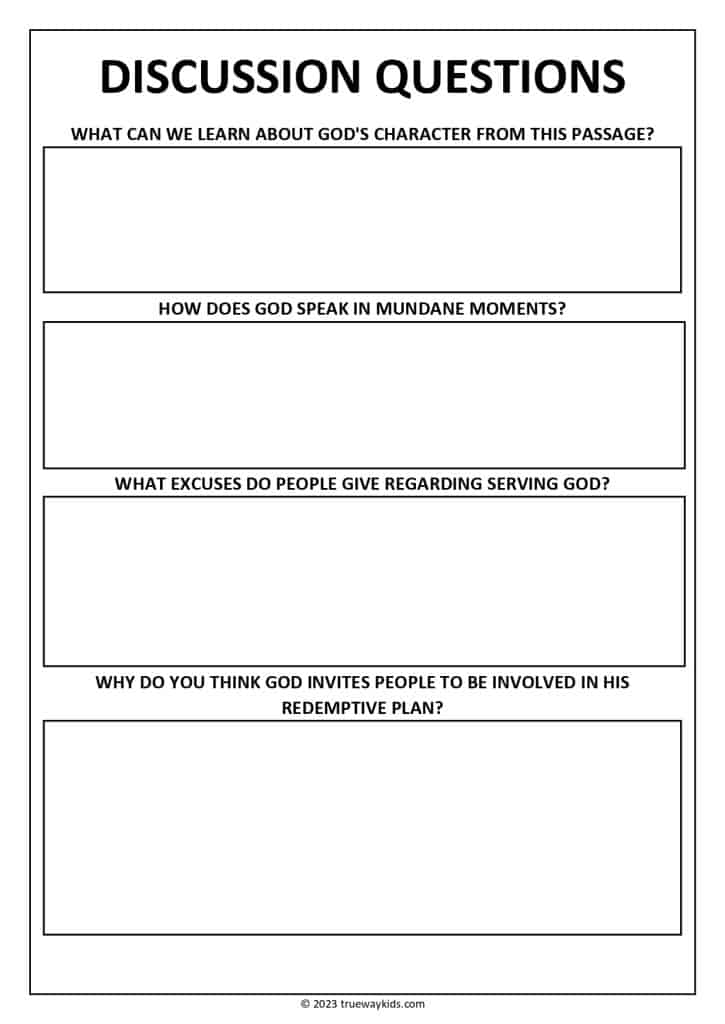
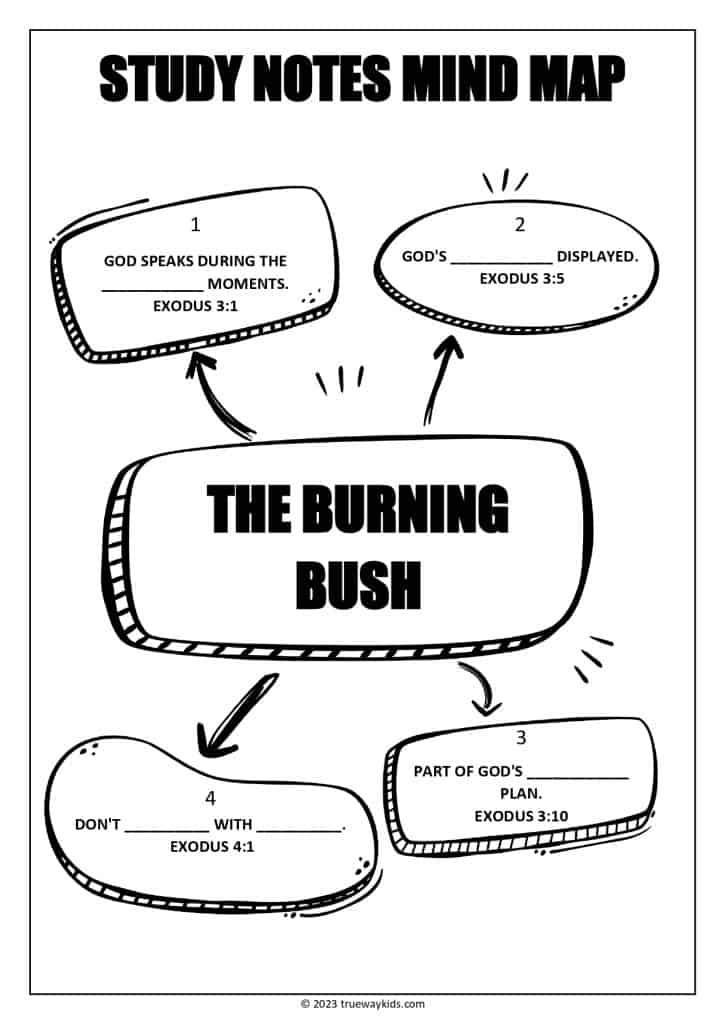
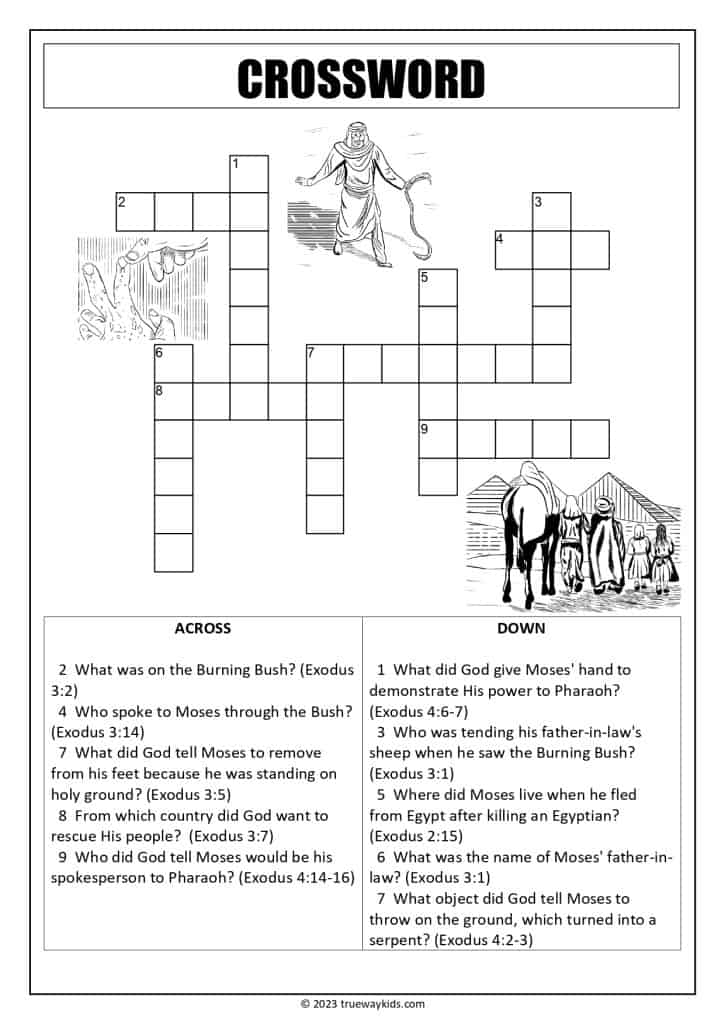
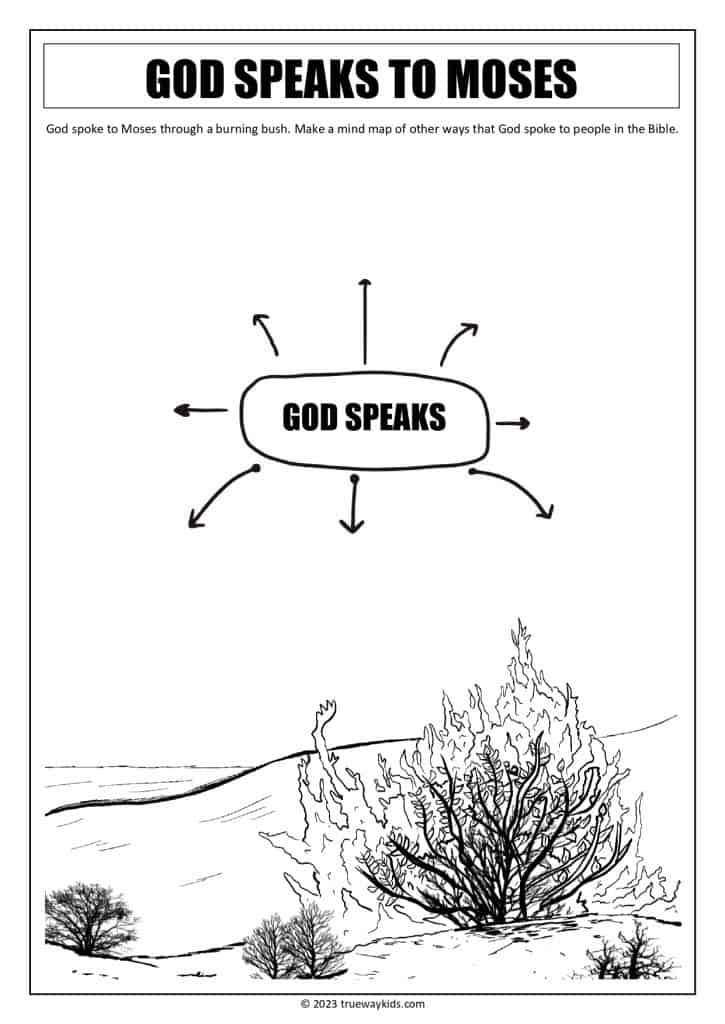
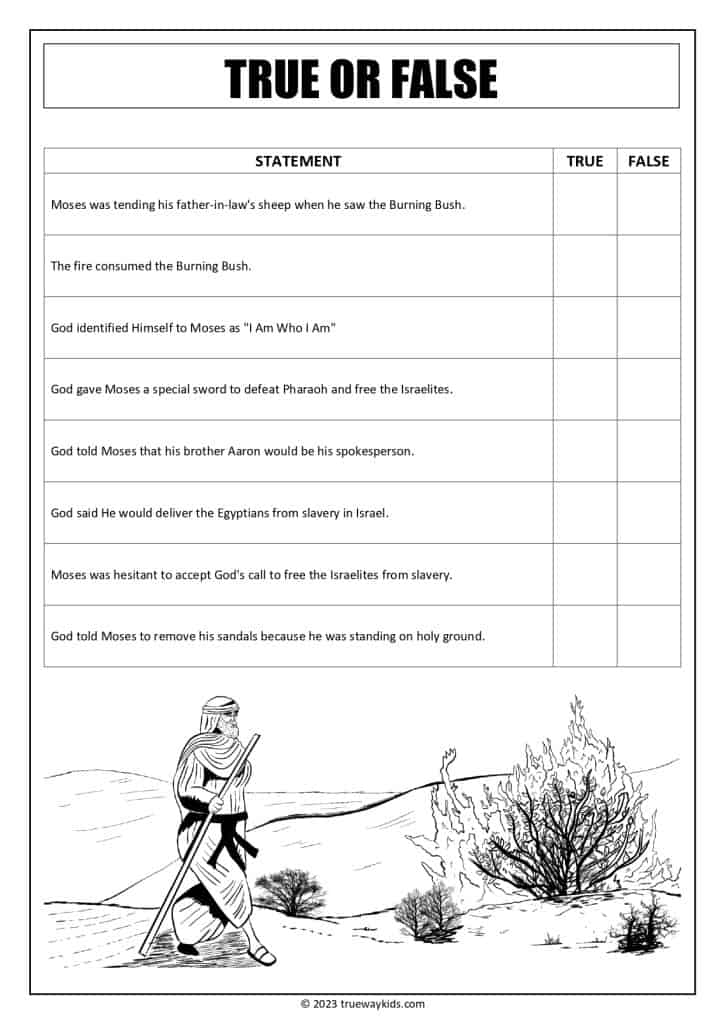
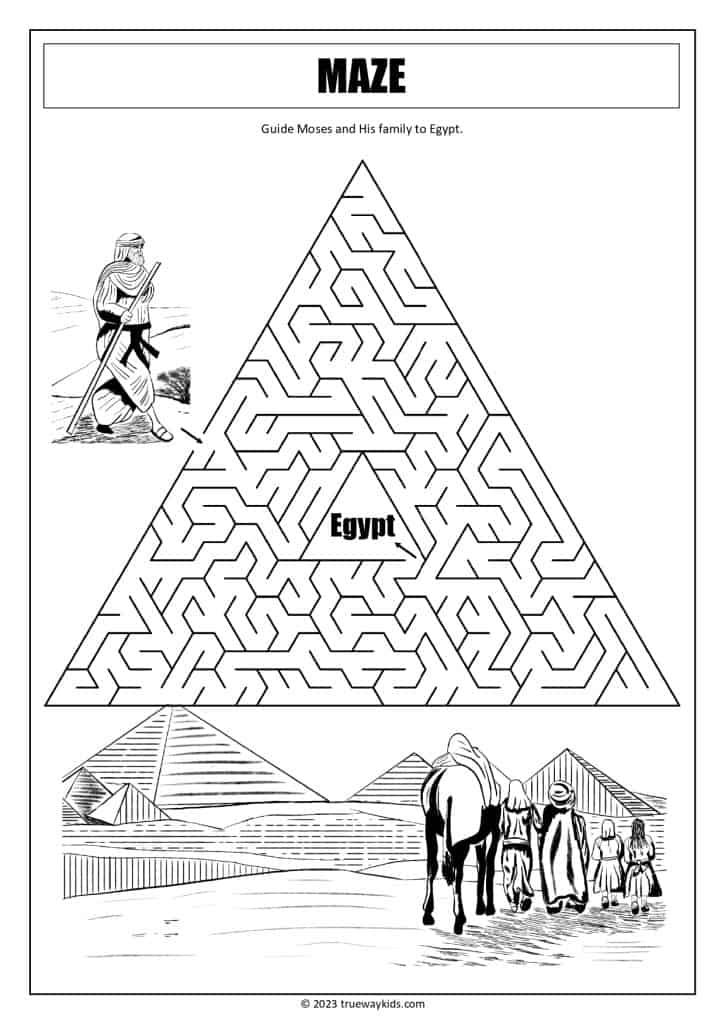
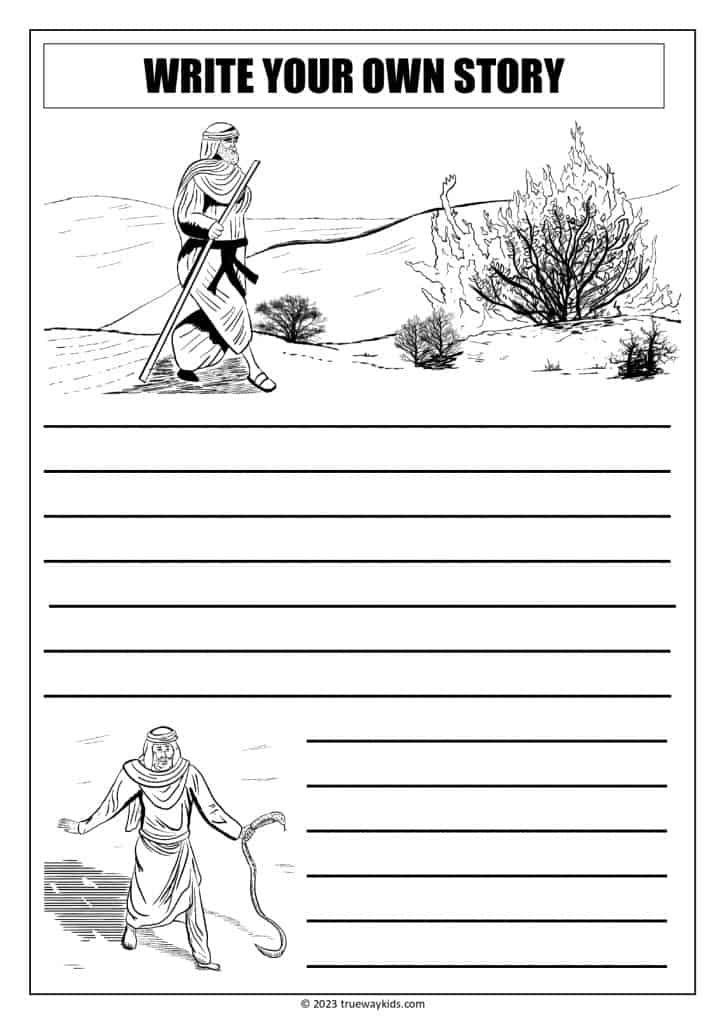
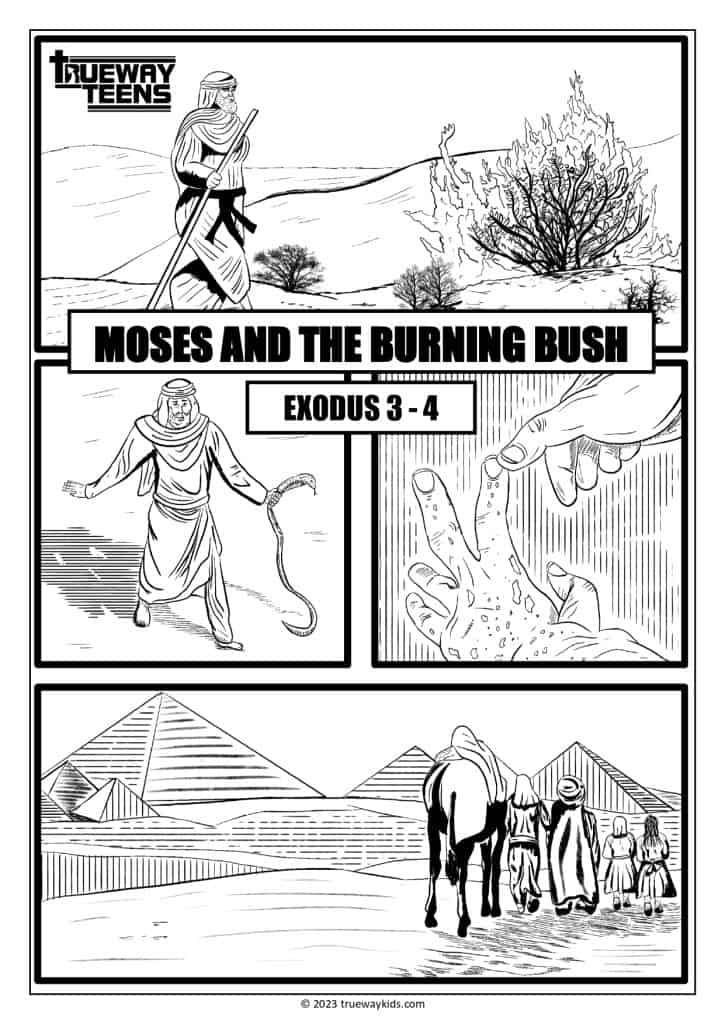
DOWNLOAD THE FREE PRINTABLE LESSON

View lesson for other age groups
Translations
| Spanish | Portuguese |
| Afrikaans | Thai (coming soon) |

